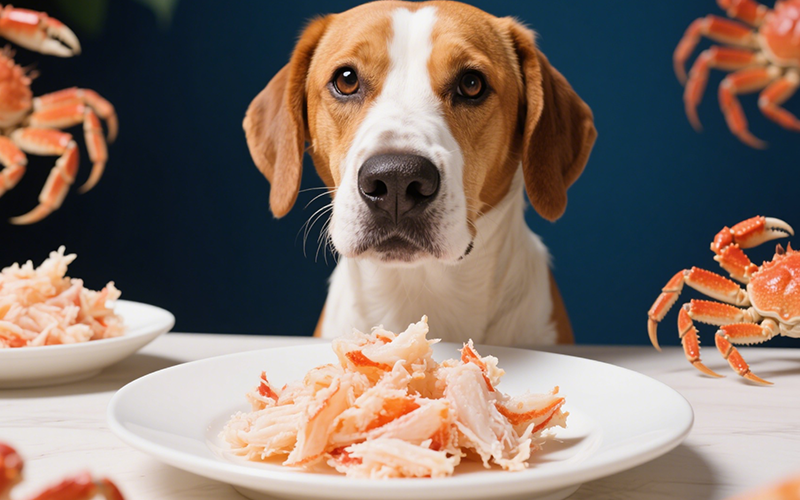Can Dogs Eat Imitation Crab? Here's What You Need to Know
- 7 Apr 2025 16:44
Imitation crab is a popular seafood alternative often used in sushi or salads. But when it comes to your dog, you might wonder whether it's safe for them to enjoy this treat. While imitation crab may seem harmless, there are a few important factors to consider before sharing it with your furry friend.

Can Dogs Eat Imitation Crab? 🤔
It’s not recommended to feed dogs imitation crab regularly. While small amounts of imitation crab may not be toxic, it’s not the best option for your dog due to certain ingredients and potential risks. Let’s explore why imitation crab isn’t ideal for dogs.
What is Imitation Crab? 🦀
Imitation crab (sometimes called "surimi") is a processed seafood product made from fish (often pollock) and other ingredients to mimic the texture and flavor of real crab meat. It’s a processed food, often packed with artificial ingredients, preservatives, and excessive sodium, which can pose health risks for your dog.
The Risks of Imitation Crab for Dogs 🚨
High in Sodium 🧂
Imitation crab is typically high in sodium, which can be harmful to dogs if consumed in excess. Too much sodium can lead to dehydration, kidney issues, and potentially salt poisoning. It can also contribute to high blood pressure and heart disease in the long run.Artificial Additives and Preservatives 🏷️
Imitation crab often contains artificial colors, flavors, and preservatives that aren’t beneficial for your dog. Some of these additives can be hard to digest and may cause stomach upset or allergic reactions in sensitive dogs.Fish Allergy 🐟
Some dogs may have allergies to fish or seafood in general, and imitation crab, despite being processed, still contains fish-based ingredients. If your dog has a known fish allergy, you should avoid giving them imitation crab to prevent allergic reactions like itching, vomiting, or diarrhea.Added Fillers 🏭
Imitation crab often contains fillers like starches, sugars, and other ingredients that provide texture but offer little nutritional value for your dog. These fillers can contribute to weight gain or digestive issues if consumed in large amounts.
What to Do if Your Dog Eats Imitation Crab 🚨
If your dog eats imitation crab accidentally, it’s important to monitor them closely for any signs of upset stomach, vomiting, or diarrhea. Since imitation crab is not typically toxic to dogs in small amounts, they may only experience mild digestive discomfort.
However, if your dog has eaten a large amount or seems to be showing symptoms of allergic reaction or salt poisoning (such as excessive thirst, vomiting, or lethargy), contact your veterinarian immediately for guidance.
Healthier Alternatives for Dogs 🦴
If you want to share a seafood treat with your dog, there are healthier, safer options that are more suitable for their diet. Here are some alternatives to imitation crab:
Cooked Fish (No Bones) 🐟
Fresh, cooked fish like salmon or tilapia can be a healthy protein source for your dog, provided it’s boneless and free of any seasonings like garlic or salt. Fish is packed with omega-3 fatty acids, which are great for your dog’s coat, skin, and joint health.Chicken or Turkey 🍗
Lean, cooked chicken or turkey can be a good alternative to seafood. They are easy to digest and provide high-quality protein without any of the concerns of seafood allergies.Plain Shrimp 🍤
Plain, cooked shrimp (without shells or seasoning) can be a great treat for your dog. Shrimp is low in calories and high in protein and vitamins, making it a nutritious option when given in moderation.Carrot Sticks 🥕
If you’re looking for a non-meat option, carrot sticks are a low-calorie, fiber-rich snack that many dogs enjoy. They’re crunchy and provide vitamins and minerals that support overall health.Canned Pumpkin 🎃
If you’re looking for a healthy and tasty treat, try plain canned pumpkin (without added sugar or spices). It’s great for digestion and can help with constipation or diarrhea.
How PettureX Can Help 🧠
If you’re ever unsure whether a food is safe for your dog or need advice on portion sizes, PettureX provides 24/7 consultations and personalized recommendations. The software’s pet image recognition can help you keep track of your dog’s health and dietary needs to ensure they stay happy and healthy.
Conclusion: Can Dogs Eat Imitation Crab? ❌
It’s best to avoid feeding imitation crab to your dog regularly. While small amounts are unlikely to cause serious harm, the high sodium content, artificial additives, and potential allergens make it an unhealthy choice for your furry friend. Stick to safer, more nutritious alternatives like cooked fish or chicken, and always be mindful of what you’re feeding your dog.
If you need more guidance or have concerns about your dog’s diet, PettureX is here to help with 24/7 consultations to ensure your pet’s health is always a top priority. 🐶💚
Need help with your dog’s health or diet? Try PettureX for 24/7 consultations and pet care assistance!
Related

Can Dogs Eat Peaches? Vet Explains Benefits, Cyanide Risks & Safe Serving
- 16 Apr 2025
Can Dogs Eat Mulberries? Vet Explains Safety, Benefits & Potential Risks
- 16 Apr 2025
Can Dogs Eat Mozzarella? Vet Explains the Cheesy Truth (Risks & Benefits)
- 16 Apr 2025
Can Dogs Eat Maple Syrup? The Sugary Truth & Why Vets Advise Against It
- 16 Apr 2025
Can Dogs Eat Mango Skin? Vet Explains Why It's a Risky Chew!
- 16 Apr 2025
Can Dogs Eat Mac n Cheese? Vet Explains Why This Comfort Food Is Unsafe!
- 16 Apr 2025
Can Dogs Eat Liver? Vet Guide to This Nutrient-Dense Organ Meat (Benefits & Risks!)
- 16 Apr 2025
Can Dogs Eat Lamb? Vet Insights on This Nutritious Meat Option
- 16 Apr 2025
Can Dogs Eat Licorice? The Sweet Danger & Glycyrrhizin Risk Explained by Vets
- 16 Apr 2025
Can Dogs Eat Jelly? The Sweet Truth About Sugar, Xylitol & Why Vets Say No!
- 16 Apr 2025
